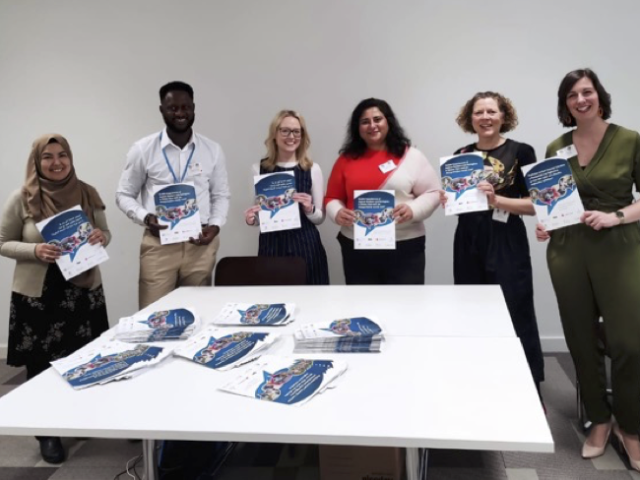
Better access to NHS services for people seeking sanctuary in Wales – Refugee Week 2023
22 June
A study funded by Health and Care Research Wales has gathered valuable insights into NHS interpretation services available to people seeking sanctuary in Wales.
A team of researchers from asylum-seeking and refugee communities worked with Public Health Wales and the third sector to investigate the health, wellbeing and healthcare experiences of adult asylum seekers and refugees in Wales as part of the Health Experiences of Asylum Seekers and Refugees in Wales 2 (HEAR2) study.
As part of the study, Dr Ashra Khanom, from Swansea University, trained peer researchers to speak directly with asylum seekers and refugees to better understand their experience of using NHS interpretation services. Dr Khanom and awardee of a Health and Care Research Wales Fellowship, then worked with Public Health Wales and the third sector to investigate the health, wellbeing and healthcare experiences of adult asylum seekers and refugees.
Speaking during Refugee Week (19-25 June 2023), Dr Khanom said that taking part and helping with research could help sanctuary seekers become a part of their new community.
However, ensuring that people had access to all of the NHS’ supporting tools and services is important as well. Sanctuary seekers in Wales are entitled to receive NHS healthcare, including access to interpretation to meet any language needs they may have.
Dr Khanom, the lead researcher of the HEAR1 study, said:
When the time came to do the focus groups during HEAR1, I had an Arabic interpreter and a Tigrinya interpreter, and I was interpreting in Hindi – so we had three languages going on in one focus group which allowed us to be inclusive and gather a range of views and recommendations.”
The research has provided new evidence on the quality of interpretation services in primary and emergency healthcare in Wales.
Faruk Ogut, a Chief Coordinator Officer from one of the involved 3rd sector organisations Displaced People in Action, said:
By contributing to research projects on refugees’ needs and aspirations, we can come up with real, accurate findings and recommendations. In order to provide better outcomes for refugees and asylum seekers, we need to identify barriers and implement effective strategies.”
The research found their need for interpretation is complex, with some not needing or preferring not to have it while others reported challenges in accessing it during NHS care, particularly in unplanned situations. Patients generally reported high levels of satisfaction with interpretation services when able to access them, but there were instances where the service was not appropriate or not tailored to their specific needs. Interpretation was sometimes provided by family members or friends during medical consultations, which can make privacy or confidentiality difficult. When a professional interpreter was available, the sanctuary seekers often did not have a choice in the gender or dialect of their interpreter and were not offered the same interpreter for subsequent health visits during a course of treatment.
Dr Gill Richardson, Chief Investigator HEAR2 Study, Consultant in Public Health Medicine, Public Health Wales explained:
The right to understand and be understood is fundamental to seeking and receiving health and care services and is therefore a basic human right. This study emphasises the steps we can take to ensure all are able to access our services in NHS Wales.”
The study recommends several actions for those involved in arranging interpretation services in the NHS in Wales and the UK with future the UK wide evaluation of interpretation services for asylum seekers and refugees recommended.
To keep up with other valuable research happening in Wales sign up to our Today’s Research bulletin.